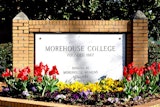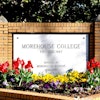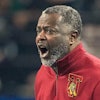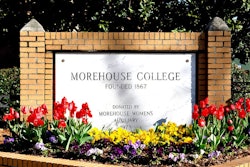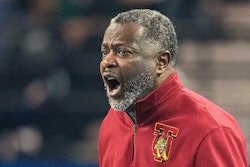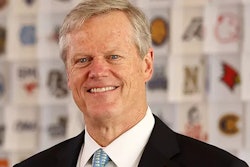The NCAA has taken a number of body blows this year from the establishment of a players union at Northwestern to athlete complaints at Grambling. But the lawsuit involving former UCLA basketball player Ed O’Bannon and 19 other plaintiffs could be the hardest hitting yet.
It may not be the death blow as some wanted or feared. But it’s hard enough to establish some sense of equity in an era of multimillion-dollar sports programs.
The 99-page federal court decision in the O’Bannon case is complicated. But the score is simple: Student athletes win. The NCAA, as we know it, loses.
U.S. District Judge Claudia Wilken’s decision released on Friday brings on a new sense of fairness to college locker-rooms. But NCAA officials were still poring over the document to figure out exactly what it will mean and cost to colleges and university athletic programs.
Judge Wilken’s ruling sided with the former student athletes’ claim that they had a right to be compensated for the use of the names and images by the NCAA.
Wilken was persuaded by what she saw as the unrefuted testimony of the plaintiffs’ economic expert, Dr. Roger Noll.
Noll cited how the top recruits were hurt by NCAA rules that limited the amount of money athletes could get by outside sources, school grants-in-aid, and a ban on endorsements.
It was enough to convince the judge who wrote that the evidence showed, “that student-athletes themselves are harmed by the price-fixing agreement among FBS football and Division I basketball schools. In the complex exchange represented by a recruit’s decision to attend and play for a particular school, the school provides tuition, room and board, fees, and book expenses, often at little or no cost to the school. The recruit provides his athletic performance and the use of his name, image, and likeness. However, the schools agree to value the latter at zero by agreeing not to compete with each other to credit any other value to the recruit in the exchange. This is an anticompetitive effect. Thus, the Court finds that the NCAA has the power — and exercises that power — to fix prices and restrain competition in the college education market that Plaintiffs have identified.”
The suit dealt primarily with Division 1 basketball and Football Bowl Subdivision (FBS) schools. Currently there are 120 elite FBS schools.
It was unclear how the judge’s ruling will apply to all the NCAA schools, including small and D-III schools, or even whether it would apply to women’s sports.
Paying players could be a setback for small schools that may not get the kind of revenues from athletics as bigger schools. And that’s the sort of detail that was left out of the plan.
What seemed to rankle all parties is the actual remedy the judge proposed: the establishment of a trust for eligible athletes that could be capped at $5,000 per year and payable when they leave college.
For some schools, that may be low enough to appease all concerned. For players, it may not be seen as enough compensation.
And for those who saw the lawsuit as a way to assert the “student” in student-athlete, there was disappointment that the award came upon leaving college, and not “upon graduation.”
The ruling fully anticipated an appeal, and noted how any changes would start in the next football/basketball cycle in 2016.
That may give the big athletic powers, many of them state public schools, time to begin the counterattack almost immediately. Of course, that would be the use of political pressure in Congress to seek an anti-trust exemption.
Just like professional athletic leagues.
Emil Guillermo writes on issues of race, culture and politics for the Asian American Legal Defense and Education Fund (www.aaldef.org/blog) Like him at www.facebook.com/emilguillermo.media ; twitter@emilamok

